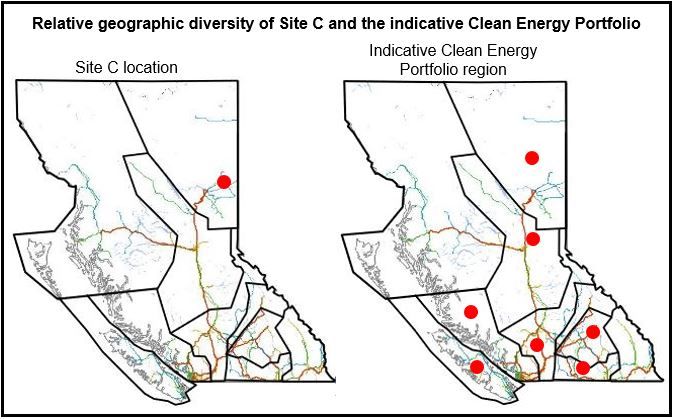Smaller clean-energy plants make more economic sense than the proposed Site C dam for British Columbia, says a new independent study commissioned by the Clean Energy Association of British Columbia (CEBC).
According to the study, carried out by London Economics International (LEI), using small clean-energy plants would save British Columbians a considerable about of money when compared to the Site C dam proposal.
LEI, an international financial, economic, and strategic professional services company specializing in infrastructure, energy and water, found that the savings could come from “right-sizing and right timing” of clean-energy projects.
The cleaner and cheaper alternative costs were spread by the study authors over a period of 70 years, which is the assumed life of the Site C dam and generating station on the Peace River of northeast British Columbia.
Source: “Cost-effectiveness evaluation of clean energy projects in the context of Site C”
Clean energy is a compelling alternative
While acknowledging that the Site C plan has several strengths, the independent LEI researchers demonstrated how cost-effective clean energy is a compelling alternative. The authors believe it is an option that the provincial government should consider.
Apart from the cost advantages of the clean energy option, it also offers a greater geographic dispersion around the province, makes procurement and logistics activities easier to accomplish, offers more plentiful and meaningful opportunities for First Nations participation, and will benefit from the falling costs of several renewable technologies.
With a much greater number of different suppliers tendering for BC’s future power requirements, it would keep prices down and could also transfer the construction risk to the private sector.
Source: London Economics International LLC
Site C costs underestimated?
According to the LEI study, the costs of Site C may end up being much higher than current estimates.
Executive Director of Clean Energy BC, Paul Kariya, said:
“The study shows that clean energy in BC is a force to be reckoned with and recognized,” said Paul Kariya, executive director of Clean Energy BC.”
Mr. Kariya said Clean Energy BC wants to carry on working with BC Hydro and the BC government.
Mr. Kariya said:
“We want to ensure that BC ratepayers fully understand the cost-effective alternatives and benefits to jobs and investment—especially to regional development—and that ratepayers receive value for money for any new power infrastructure.”
“British Columbia is at a pivotal time in the procurement of its energy needs and we need to ensure that the decisions we make are in the best interest of ratepayers, as well as, protecting the long-term financial viability of BC Hydro.”
The 86 current clean-energy projects in operation in BC directly employ 1,300 workers in the region. A further 21 clean-energy projects are being build, which represent a total capital expenditure of $4.5 billion.


